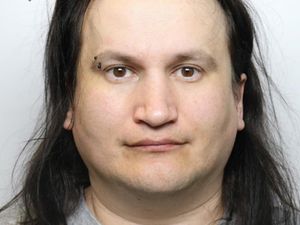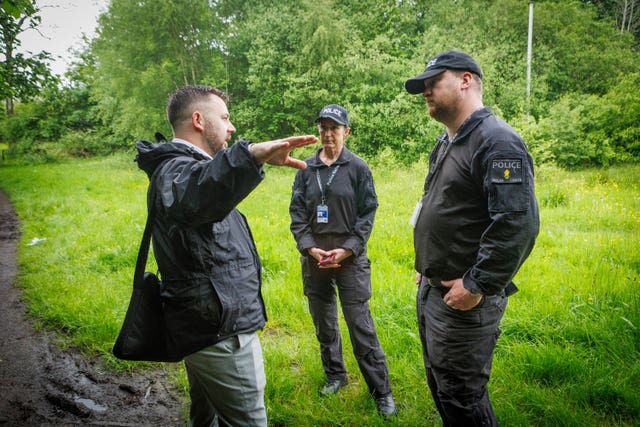‘Body parts’ killer jailed for life for murder of pensioner housemate
Deby-ridden Marcin Majerkiewicz, 42, murdered Stuart Everett, 67, before dismembering and dumping his body.

A Polish man has been jailed for life with a minimum term of 34 years for the murder and dismemberment of a pensioner he sawed into 27 pieces.
Marcin Majerkiewicz, 42, who police say had an obsession with gore and gruesome horror and has a tattoo of slasher-film character Jason from Friday The 13th, bludgeoned Stuart Everett with a hammer at the house they shared in Winton, Salford.
The defendant then used a hacksaw to dismember his 67-year-old friend and housemate, described as a jolly, friendly, mild-mannered man.
He also flayed the face off Mr Everett’s skull before taking body parts in plastic bags on bus journeys across Salford and Manchester to dump the evidence.
Majerkiewicz, a father-of-two with his Polish ex-partner, denied responsibility for the killing in March last year, but offered no evidence in his defence.
Jurors convicted him last Friday of the murder in under two hours of deliberations following a three-week trial at Manchester Crown Court.
The court heard he almost got away with it after disposing of the body, tricking Mr Everett’s family that he was still alive and planning to flee abroad. But a “great piece of luck” and dogged police work led to his arrest.
Trial judge Mr Justice Cavanagh told Majerkiewicz, who made no reaction as he was jailed, it was pre-planned murder for gain, to steal Mr Everett’s money to pay off the killer’s spiralling debts.
He said: “You acted in an almost unbelievably cold-blooded and macabre way and showed complete disrespect and contempt for your friend’s remains.
“This denied dignity to Stuart Everett even in death and greatly increased the pain suffered by Stuart Everett’s family when the murder came to light.”
Retired civil servant Mr Everett was murdered overnight between March 27 and 28 last year.
But police were only alerted after his torso was found by a member of the public at Kersal Dale nature reserve in Salford on April 4.
Police scoured CCTV from the area and discovered, two days before, a man entering the wooded area carrying a heavy blue bag and emerging shortly after without it.
His identity was unknown but three weeks later, Majerkiewicz was spotted by an officer working on the case who drove past him by chance and noted he looked like the man from the CCTV.
The killer was arrested.

When police searched his address in Winton, Salford, they found evidence of blood on a carpet and furniture and an attempted clean-up after the killing and dismemberment.
Only a third of Mr Everett’s body has been recovered.
Born Roman Ziemacki to Polish parents who came to the UK after surviving two years in a Russian concentration camp and settled in Derby, Mr Everett first met his killer while teaching English to recently arrived Polish immigrants in Manchester.
Mr Everett had worked for the NHS and Department for Work and Pensions, was known as “Benny” to his family, was not married and had no children, and was a fan of “Rat Pack” singers Dean Martin and Frank Sinatra.
He also enjoyed gardening, cricket and a bet on horses.
His brother Richard Ziemacki, in a victim impact statement read to the court, said: “It’s extremely difficult to put into words how much I miss him. Seeing my brother on CCTV and listening to his voice for the last time will be moments that will live with me forever – I have no words other than absolutely horrendous.
“Every day we have sat watching in disbelief as the evidence unfolded and clearly shown the way my brother’s end had been planned and orchestrated by an incredibly devious, monstrous individual.”
In 2013, Mr Everett began living in a three-bed terrace house on Worsley Road in the Winton area of Salford.
He began sub-letting the two other bedrooms to two Polish men, Michal Polchowsk, 68, with the other, Majerkiewicz, moving in during 2017.
The defendant had worked as a manager at fast-food shops in the Trafford Centre but was unemployed at the time of the murder, with financial pressures building in the household with Majerkiewicz owing £60,000 in loan debt and £14,000 on credit cards.

After the initial torso discovery, police launched Operation Harker, finding evidence in 15 crime scenes and human remains at five different sites.
Detectives pieced together thousands of hours of CCTV, tracking the defendant’s movements, also discovering human remains at Linnyshaw Colliery Woods, Blackleach Reservoir, Worsley Woods and Boggart Hole Clough.
Majerkiewicz also dumped parts a short walk from his home address beside a canal, and on one occasion he had a KFC meal immediately after dumping body parts.
Pathology of the skull fragments showed Mr Everett had been subject to a “sustained, severe blunt-force physical assault”, with repeated blows to his head, shattering and fracturing his skull.
In Majerkiewicz’s bedroom there was heavy bloodstaining, suggesting Mr Everett was attacked and dismembered in that room.
The third occupant of the house, food-processing factory worker Mr Polchowski, was living at the address at the time of the murder and dismemberment.
A murder charge against him was later dropped.
Mr Everett’s family initially had no idea he was dead.
Majerkiewicz had assumed use of his finances and his mobile phone, even sending text messages and a birthday card to his family purporting to be from Mr Everett.
He had been searching online for properties to rent in the Alicante area of Spain before his arrest.
Mr Justice Cavanagh praised Greater Manchester Police for “truly outstanding” work on the case.





